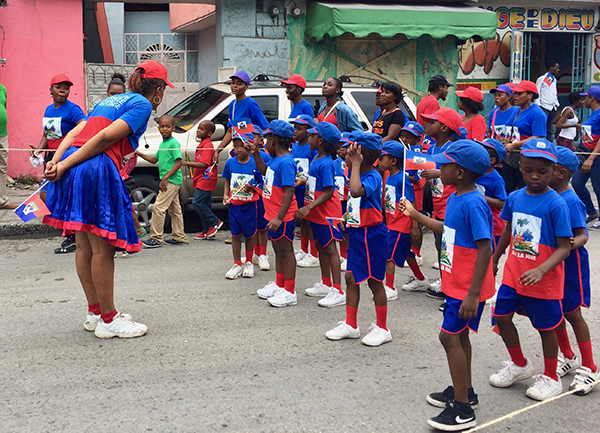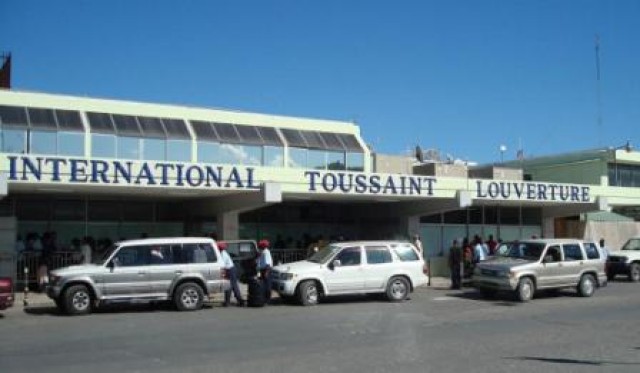Written April 2018 // I am sitting at the Toussaint-Louverture Airport in Port au Prince, Haiti, waiting for a flight back to Indiana. It is hard to sum up all the feelings I have when I go back to the US. Our work takes us to the US about 10-12 weeks per year, so I am back and forth between the 2 countries frequently. Mark and I thought we would get used to the transition, and the emotions would diminish. We were wrong.

When I travel back to the U.S., I am ecstatic to see my kids, grandkids, siblings, mother, extended family, old friends. I am very grateful for today’s means of communications, although facetime doesn’t come close to a real live snuggle session with my grandchildren, or an intimate conversation with my sister over coffee. Many of the daily stressors I feel in Haiti melt away when I am in the U.S., including the uncertainty of navigating a foreign culture and language, never knowing when a protest may spring up on our way to work, being asked for money or other commodities at every turn, being stared at wherever we are, and never really having the privacy we know in the U.S. Being back in a familiar place, the town where we raised our kids and developed our life-long friendships, is comfortable and reassuring. Knowing there are a zillion benefits our country provides every day that we don’t even think about, like smooth roads, a well-developed justice system, free public education, and so much more, makes life in the U.S. easy on many levels.
All of those warm and fuzzy feelings are mixed in with a variety of very uncomfortable feelings. I am privileged. I was born into privilege. There is no denying that. I have the ability to whip out my passport and credit card and fly to a developed country where I am a citizen with all its rights and privileges. In Haiti, I interact with people on a weekly basis who are bright, ambitious, educated, but can’t find consistent work. I leave them to go to the U.S., where I see “Now Hiring” signs at every turn. That feels weird, and unfair. I leave a country where a large percentage of people go hungry on any given day, to see an airport food court full of food, more food in one place than many of our Haitian friends have ever seen all at once. Just in one food court. That feels weird, and unfair. And I could go on…
 But Haiti has long been viewed by many as a country full of poor, helpless people that need foreign help to survive and advance. Haiti is a financially poor country, it is true, but rich in a vast variety of other ways, ways often overlooked by foreigners. The sense of community here is something we don’t often see in the U.S., not to the extent we see in Haiti. The resilience of the Haitian people is something from which the rest of the world can learn. The pride Haitians have in their country, their heritage, their culture, despite years of patristic and superior attitudes from other people groups, is something to be revered. Haiti is a place that the rest of the world would be bettered by visiting, with the sole purpose of learning about the Haitian people.
But Haiti has long been viewed by many as a country full of poor, helpless people that need foreign help to survive and advance. Haiti is a financially poor country, it is true, but rich in a vast variety of other ways, ways often overlooked by foreigners. The sense of community here is something we don’t often see in the U.S., not to the extent we see in Haiti. The resilience of the Haitian people is something from which the rest of the world can learn. The pride Haitians have in their country, their heritage, their culture, despite years of patristic and superior attitudes from other people groups, is something to be revered. Haiti is a place that the rest of the world would be bettered by visiting, with the sole purpose of learning about the Haitian people.
And living in Haiti, honestly, for the first couple years, I was stretched so far and tight I thought I might break. But now, Haiti has become a part of me, my second home. I continue to be stretched, and am learning more about God and myself than I ever have before. I am not Haitian, and can never be. If I lived the next 30 years of my life in Haiti, I would continue to learn new things about the Haitian people, the language, and the culture here every day (and I would also be very old!). No, I am not Haitian, but neither am I the person I was before I moved here. I have heard it said that living in a foreign country is like this: In the U.S., everyone is yellow. I was once yellow. Haitians are blue. Living in Haiti, I now am a shade of green. Green like Kermit. And sometimes it’s not easy being green. But I wouldn’t have it any other way.

